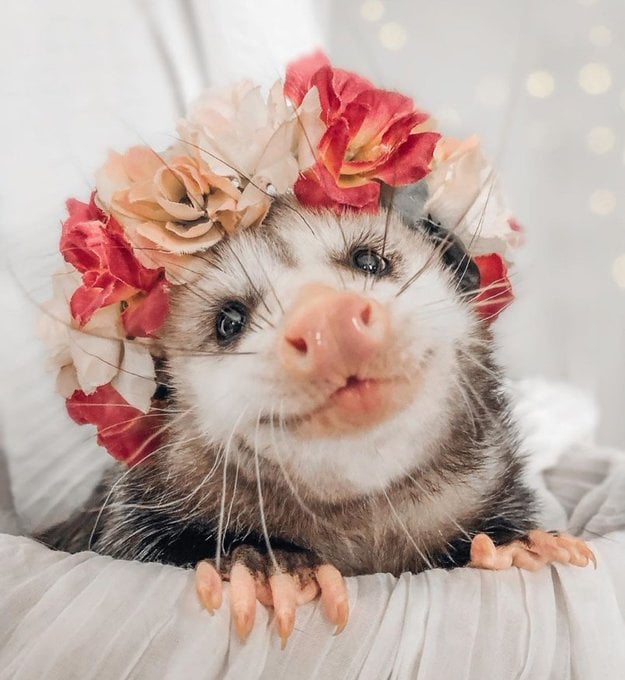Petunia, a Virginia Opossum, was brought to the Wildlife Medical Clinic in May of 2022 as a joey, which is the term used to describe a baby opossum. A Good Samaritan rescued her and her siblings after their mother was hit by a car.
While her siblings were eventually transferred to a Licensed Wildlife Rehabilitator to be released when they were old enough, Petunia was kept at the Wildlife Medical Clinic.
Petunia stayed behind because she was missing her left eye. Based on her age, we determined this was more than likely a birth defect and not an injury, but this unfortunately would make her less likely to survive in the wild and not a good candidate for release.
Having one eye affects her depth perception, which leaves her more vulnerable to predation and could increase her chances of being struck by a vehicle while trying to cross a road. Because of this, her young age, good health, and calm demeanor, we made the decision to have her join our Wildlife Ambassador program.
At the Wildlife Medical Clinic, she was initially fed several times a day with formula and then transitioned onto solid food when she was old enough. Once it was determined that she was non-releasable and her siblings were transferred out, we were able to start working more with Petunia to get her acclimated to humans.
Petunia is now scale and harness trained and is becoming more and more comfortable around her animal care staff as they work with her daily.
Opossum Facts:
-Virginia Opossums are the only marsupial in North America.
-Virginia Opossums have the most teeth (50) of any North American mammal!
-Virginia Opossum are nocturnal, which means they are active at night and sleep during the day.
-While it is common in movies and other depictions to see opossums hanging by their tails, this isn’t very common in real life. Especially not in adult opossums, who primarily use their tail for balance and collecting nesting materials.
-They use the nesting material to pad their sleeping areas and help conceal themselves while they are sleeping.
-While most animals will leave their young unattended periodically throughout the day while they feed, that is not the case with opossum. Opossum moms always stay with their offspring, but unfortunately if one falls off their back or out of their pouch, they don’t always realize and will keep moving. Therefore, if you find an opossum joey less than 7 inches in size, separated from mom, the best thing to do is take it to a licensed wildlife rehabilitator as mom is not coming back for it.

